if 条件状语从句
- 格式:pptx
- 大小:15.57 MB
- 文档页数:25
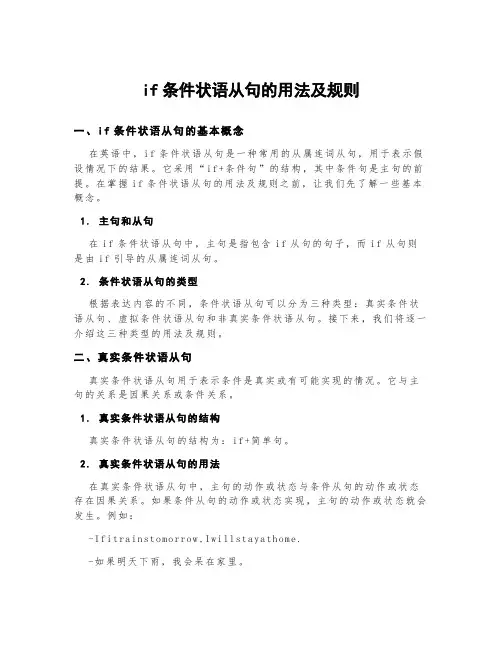
if条件状语从句的用法及规则一、i f条件状语从句的基本概念在英语中,i f条件状语从句是一种常用的从属连词从句,用于表示假设情况下的结果。
它采用“i f+条件句”的结构,其中条件句是主句的前提。
在掌握i f条件状语从句的用法及规则之前,让我们先了解一些基本概念。
1.主句和从句在i f条件状语从句中,主句是指包含if从句的句子,而i f从句则是由if引导的从属连词从句。
2.条件状语从句的类型根据表达内容的不同,条件状语从句可以分为三种类型:真实条件状语从句、虚拟条件状语从句和非真实条件状语从句。
接下来,我们将逐一介绍这三种类型的用法及规则。
二、真实条件状语从句真实条件状语从句用于表示条件是真实或有可能实现的情况。
它与主句的关系是因果关系或条件关系。
1.真实条件状语从句的结构真实条件状语从句的结构为:if+简单句。
2.真实条件状语从句的用法在真实条件状语从句中,主句的动作或状态与条件从句的动作或状态存在因果关系。
如果条件从句的动作或状态实现,主句的动作或状态就会发生。
例如:-I fi tr ai ns to mo rro w,I wi ll st ay at hom e.-如果明天下雨,我会呆在家里。
上述例句中,条件从句“if it ra in st omo r ro w”表达的是“下雨”的情况,主句“Iw il ls t ay at ho me”表示的是因果关系,即如果明天下雨,我将呆在家里。
三、虚拟条件状语从句虚拟条件状语从句用于表示条件是不真实、不可能实现或对现实进行推测的情况。
1.虚拟条件状语从句的结构虚拟条件状语从句的结构为:if+过去完成时。
2.虚拟条件状语从句的用法在虚拟条件状语从句中,条件从句的动作或状态无法实现,主句的动作或状态也会受到影响。
例如:-I fI ha ds tu di ed har d er,I wo ul dh av epa s se dt he ex am.-如果我学得更努力,我就能通过考试了。
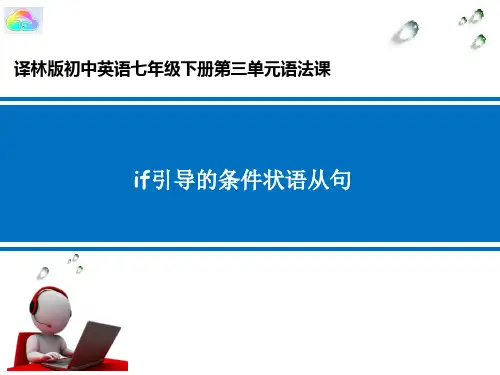
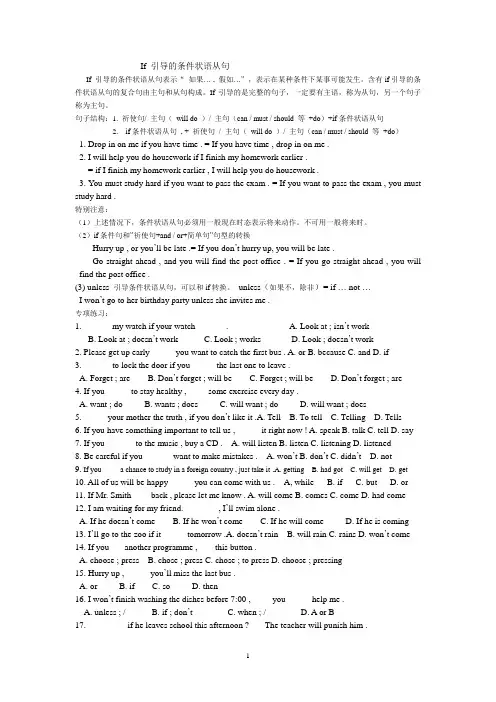
If 引导的条件状语从句If 引导的条件状语从句表示“如果… , 假如…”,表示在某种条件下某事可能发生。
含有if引导的条件状语从句的复合句由主句和从句构成。
If引导的是完整的句子,一定要有主语,称为从句,另一个句子称为主句。
句子结构:1. 祈使句/ 主句(will do )/ 主句(can / must / should 等+do)+if条件状语从句2. if条件状语从句, + 祈使句/ 主句(will do )/ 主句(can / must / should 等+do)1. Drop in on me if you have time . = If you have time , drop in on me .2. I will help you do housework if I finish my homework earlier .= if I finish my homework earlier , I will help you do housework .3. Y ou must study hard if you want to pass the exam . = If you want to pass the exam , you must study hard .特别注意:(1)上述情况下,条件状语从句必须用一般现在时态表示将来动作。
不可用一般将来时。
(2)if条件句和”祈使句+and / or+简单句”句型的转换Hurry up , or you’ll be late .= If you don’t hurry up, you will be late .Go straight ahead , and you will find the post office . = If you go straight ahead , you will find the post office .(3) unless 引导条件状语从句,可以和if转换。
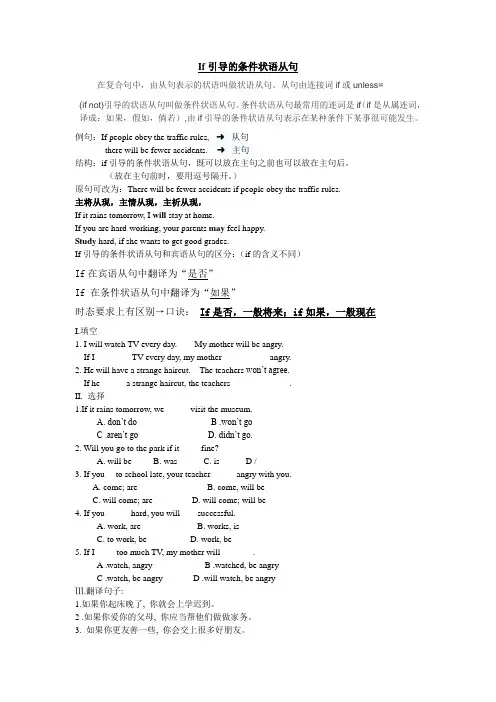
If引导的条件状语从句在复合句中,由从句表示的状语叫做状语从句。
从句由连接词if或unless=(if not)引导的状语从句叫做条件状语从句。
条件状语从句最常用的连词是if(if是从属连词,译成:如果,假如,倘若),由if引导的条件状语从句表示在某种条件下某事很可能发生。
例句:If people obey the traffic rules, ➜从句there will be fewer accidents. ➜主句结构:if引导的条件状语从句,既可以放在主句之前也可以放在主句后。
(放在主句前时,要用逗号隔开。
)原句可改为:There will be fewer accidents if people obey the traffic rules.主将从现,主情从现,主祈从现,If it rains tomorrow, I will stay at home.If you are hard-working, your parents may feel happy.Study hard, if she wants to get good grades.If引导的条件状语从句和宾语从句的区分:(if的含义不同)I.填空1. I will watch TV every day. My mother will be angry.If I ________TV every day, my mother _____ _____angry.2. He will have a strange haircut. The teachers won’t agree.If he _____ a strange haircut, the teachers______ _______.II. 选择1.If it rains tomorrow, we _____ visit the museum.A. don’t do B .won’t goC .aren’t go D. didn’t go.2. Will you go to the park if it ____ fine?A. will beB. wasC. is D /3. If you __to school late, your teacher _____ angry with you.A. come; areB. come, will beC. will come; areD. will come; will be4. If you _____ hard, you will ___ successful.A. work, areB. works, isC. to work, beD. work, be5. If I ____ too much TV, my mother will _______.A .watch, angryB .watched, be angryC .watch, be angryD .will watch, be angryⅢ.翻译句子:1.如果你起床晚了, 你就会上学迟到。


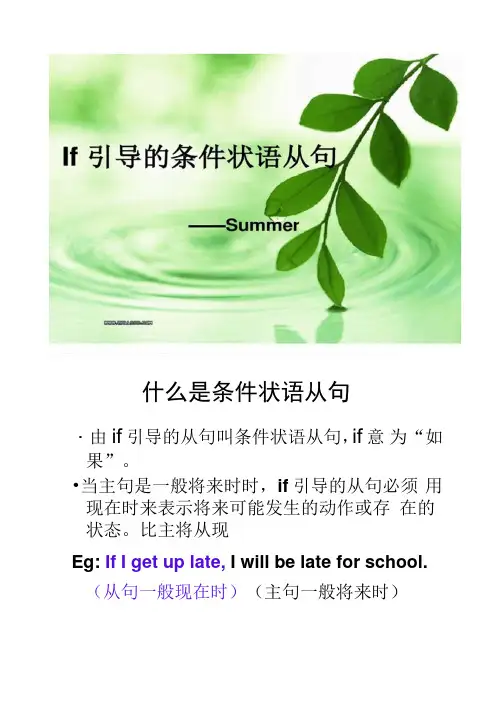
什么是条件状语从句・由if引导的从句叫条件状语从句,if意为“如果”。
•当主句是一般将来时时,if引导的从句必须用现在时来表示将来可能发生的动作或存在的状态。
比主将从现Eg: If I get up late, I will be late for school. (从句一般现在时)(主句一般将来时)条件状语从句中,主从句的位置大多数情况下,从句可以位于主句之前,也可以位于主句之后,不过当从句在前时,主从句之间必须用逗号隔开。
女口:If you study hard, you will pass the exam. 如果你努力学习的话,你就会通过考试。
I won't go to school if it rains tomorrow.女口果明天下雨我就不去学校了。
*. . y\ we will goIf it is fine tomorroIfIhaI will travel around the world./f you feel hungry, you shouldeat something.If you feel tired, you musthave a rest./f you are ill, you must goto see a doctor.If you are riding a bike inthe street, you must bevery careful:Team Work•Team 1:If he plays computer games on weekdays , what will happen?•Team 2:If you have a robot, what will you do?If he plays computer■games on weekdays,what will happen?He II be very tired in classHis parents will be sad.He wont get good grades.If you have a robot, “Hat wiHyou do?Examplegl will let it..I pIQy gamescieon my bedroomdo入_miHave a try 用把号内所给词的正确形式填空1 .Tm sure if he goes (go) to the party, hewill have (have) a great time・2.1f the rain stops (stop) tonight, we will go to the cinema. 3」'll buy a computer if I have (have) eno ugh money.4.You won't qet (not get) nervous if you do (do ) enough exercise・5.If she is (be) kind to me , I won't argue (not argue) with her.6」want to know if he comes(C ome) tomorrow, if he_Qomes_(come), I will givp (give) the massage to him. 7」f you (pay) more attention to that, he won't get (not get) injured.。
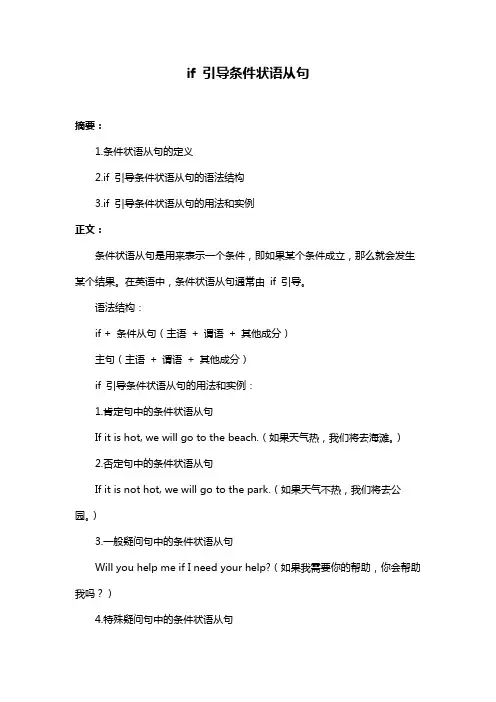
if 引导条件状语从句
摘要:
1.条件状语从句的定义
2.if 引导条件状语从句的语法结构
3.if 引导条件状语从句的用法和实例
正文:
条件状语从句是用来表示一个条件,即如果某个条件成立,那么就会发生某个结果。
在英语中,条件状语从句通常由if 引导。
语法结构:
if + 条件从句(主语+ 谓语+ 其他成分)
主句(主语+ 谓语+ 其他成分)
if 引导条件状语从句的用法和实例:
1.肯定句中的条件状语从句
If it is hot, we will go to the beach.(如果天气热,我们将去海滩。
)
2.否定句中的条件状语从句
If it is not hot, we will go to the park.(如果天气不热,我们将去公园。
)
3.一般疑问句中的条件状语从句
Will you help me if I need your help?(如果我需要你的帮助,你会帮助我吗?)
4.特殊疑问句中的条件状语从句
What will you do if you win the lottery?(如果你中彩票,你会做什么?)
通过以上实例,我们可以看到if 引导条件状语从句在各种句子类型中的用法。
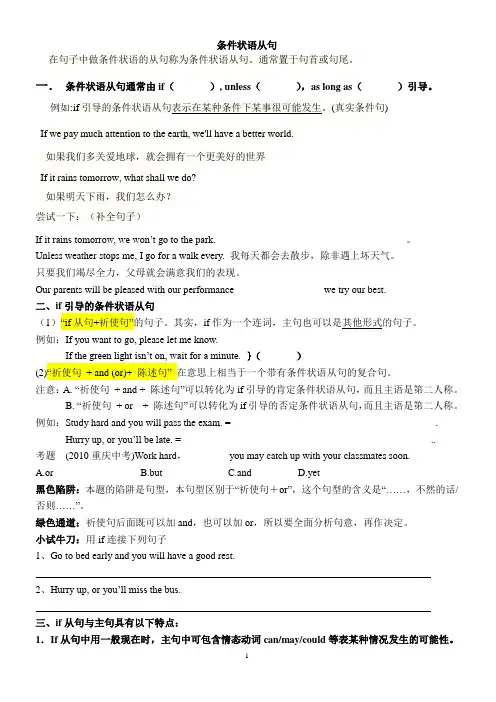
条件状语从句在句子中做条件状语的从句称为条件状语从句。
通常置于句首或句尾。
一.条件状语从句通常由if(), unless(),as long as()引导。
例如If we pay much attention to the earth, we'll have a better world.如果我们多关爱地球,就会拥有一个更美好的世界If it rains tomorrow, what shall we do?如果明天下雨,我们怎么办?尝试一下:(补全句子)If it rains tomorrow, we won’t go to the park.______________________________________。
Unless weather stops me, I go for a walk every. 我每天都会去散步,除非遇上坏天气。
只要我们竭尽全力,父母就会满意我们的表现。
Our parents will be pleased with our performance _____ _____ ______ we try our best.二、if引导的条件状语从句(1)“if从句+祈使句”的句子。
其实,if作为一个连词,主句也可以是其他形式的句子。
例如:If you want to go, please let me know.If the green light isn’t on, wait for a minute.}()(2)“祈使句+ and (or)+ 陈述句” 在意思上相当于一个带有条件状语从句的复合句。
注意:A. “祈使句+ and + 陈述句”可以转化为if引导的肯定条件状语从句,而且主语是第二人称。
B. “祈使句+ or + 陈述句”可以转化为if引导的否定条件状语从句,而且主语是第二人称。
例如:Study hard and you will pass the exam. =_________________________________________.Hurry up, or you’ll be late. =__________________________________________________..考题(2010重庆中考)Work hard,________ you may catch up with your classmates soon.A.orB.butC.andD.yet黑色陷阱:本题的陷阱是句型,本句型区别于“祈使句+or”,这个句型的含义是“……,不然的话/否则……”。
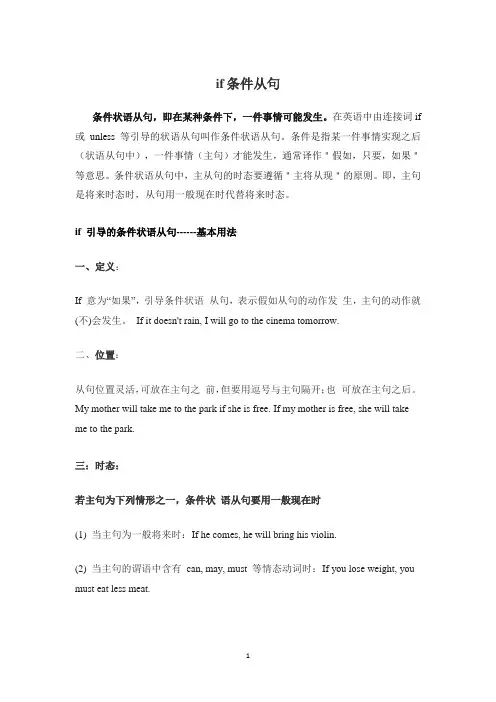
if条件从句条件状语从句,即在某种条件下,一件事情可能发生。
在英语中由连接词if 或unless等引导的状语从句叫作条件状语从句。
条件是指某一件事情实现之后(状语从句中),一件事情(主句)才能发生,通常译作"假如,只要,如果"等意思。
条件状语从句中,主从句的时态要遵循"主将从现"的原则。
即,主句是将来时态时,从句用一般现在时代替将来时态。
if 引导的条件状语从句------基本用法一、定义:If 意为“如果”,引导条件状语从句,表示假如从句的动作发生,主句的动作就(不)会发生。
If it doesn't rain, I will go to the cinema tomorrow.二、位置:从句位置灵活,可放在主句之前,但要用逗号与主句隔开;也可放在主句之后。
My mother will take me to the park if she is free. If my mother is free, she will take me to the park.三:时态:若主句为下列情形之一,条件状语从句要用一般现在时(1) 当主句为一般将来时:If he comes, he will bring his violin.(2) 当主句的谓语中含有can, may, must 等情态动词时:If you lose weight, you must eat less meat.(3) 当主句为祈使句时:If you are not strong enough, please don't take part in such an activity.注:助记口诀if 条件句不一般,三个要点记心间:主将从现、主情从现、主祈从现。
If 引导的条件状语从句------句型转换1. 借助“祈使句+and/or+句子”来转换(and 表顺承,or 表转折)If you study hard, you will pass the exam easily. = Study hard, and you will pass the exam easily. = Study hard, or you won’t pass the exam.2. 借助without或with来转换If there is no water, fish will die. = Fish will die without water.if 引导的条件状语从句------辨析1. if 引导条件状语从句和宾语从句的区别(1) if 引导条件状语从句,表示“如果”,从句需要遵循主将从现的原则If it doesn't rain, I will go to the cinema tomorrow.(2) if 引导宾语从句,表示“是否”,从句不必遵循主将从现的原则I don't know if he will come tomorrow.2. If 与其他常见连接词的辨析(1) if 意为“如果” Difficulties are nothing if we are not afraid of them.(2) unless 意为“除非;如果不” We’ll go there tomorrow unless it rains.(3) until/ till 意为“直到…” not…until 意为“直到…才” We waited until he came back. She didn’t stop working until eleven o’ clock.(4) although/ though 意为“尽管;虽然” We were not tired though /although we had worked all day.(5) since 意为“自从”或“既然” Great changes have taken place in China since 1978. Since everyone is here, let’s begin our meeting.。
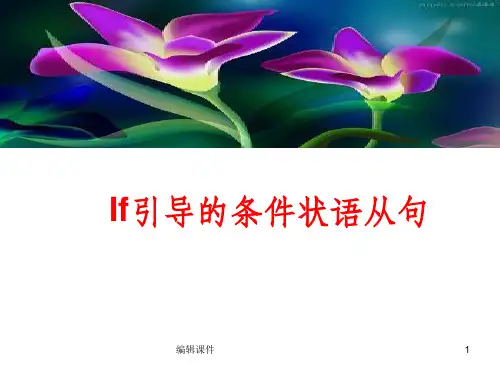
What is to become of me if you go away?如果你走的话,我的结果将是怎样呢?* he winks at you,you may wink back as well. 如果他向你使眼色的话,你也可以使眼色以示回答。
* you take this medicine,all your symptoms will fall away. 如果你使用这种药物,你的所有症状将会消失。
4.I shall write to you if anything comes up. 如果发生了什么事情我将写信告诉你。
* he is no good, flunk him. 如果他表现不好,给他不及格。
* you cannot do it, I will understand. 如果你不能做这件事,我可以谅解。
* it if you dare. 如果你敢,你就试试看。
8.I will not wear this dress if you object to it. 如果你不喜欢这件衣服,那我就不再穿它了。
* blustered out what she would do if she caught me. 她恫吓说,如果她抓住我,她会怎么办。
* you grasp this rope, I will pull you up. 如果你抓住这根绳子,我可把你拉起来。
条件状语从句一、条件状语从句通常由if(如果), unless(除非),as long as(只要)引导。
例如:If it rains tomorrow, we won’t go to the park. 如果明天下雨,我们就不去公园了。
Unless weather stops me, I go for a walk every. 我每天都会去散步,除非遇上坏天气。
Our parents will be pleased with our performance as long as we try our best.小试牛刀:1、只要我们竭尽全力,父母就会满意我们的表现。
Our parents will be pleased with our performance _____ _____ ______ we try our best.2、如果人人为保护环境做出贡献,世界将会变得更美好。
______ ______ ______ _____ _______ to protecting the environment, the world will become much more beautiful.二、if引导的条件状语从句(1)“if从句+祈使句”的句子。
其实,if作为一个连词,主句也可以是其他形式的句子。
例如:If you want to go, please let me know.If the green light isn’t on, wait for a minute.(2)“祈使句+ and (or)+ 陈述句” 在意思上相当于一个带有条件状语从句的复合句。
注意:A. “祈使句+ and + 陈述句”可以转化为if引导的肯定条件状语从句,而且主语是第二人称。
B. “祈使句+ or + 陈述句”可以转化为if引导的否定条件状语从句,而且主语是第二人称。
例如:Study hard and you will pass the exam. =If you study hard, you will pass the exam.Hurry up, or you’ll be late. =If you don’t hurry up, you’ll be late.考题(2010重庆中考)Work hard,________ you may catch up with your classmates soon.A.orB.butC.andD.yet思路解析:本句是“祈使句+and”的句型,句意为“努力学习,你会很快赶上其他同学的”,and在句中表示承接关系,所以选C项。
if引导的条件状语从句一、概念条件状语从句是表示主句动作发生的前提或条件的从句,即“在......条件下某事才能发生”。
通常由连词if引导二、位置if引导的条件状语从句可位于主句之前或之后。
位于主句之前要用逗号与主句隔开;如果放在主句之后,其前不必用逗号。
三、时态若主句为一般将来时、祈使,或主句含有can、may、must、 have to等情态动词或短语时,if引导的条件状语从句要用一般现在时。
(主将从现)例句:1.If it rains tomorrow, I won't go to school.=I won't go to school if it rains tomorrow.如果明天下雨,我就不去上学。
2.If he watches TV, I will watch TV,too.如果他看电视,我也会看电视。
3.You can pass the exam if you study hard.如果你努力学习,你就能通过这次考试。
四、句型相互转换:①祈使句+and/or+一般将来时的句子If you are quick, you won 't be late for school.= Be quick, and you won't be late for school.= Be quick, or you will be late for school.②含有介词with或without的句子If there is no water, fish can 't live. =Fish can't live without water.五、if还可引导宾语从句,意为“是否”。
I don't know if he will come back tomorrow.我不知道他明天是否回来。
If 条件状语从句归纳总结1. if意为“如果”,引导条件状语从句,可放在主句后,也可放在主句前,常用逗号隔开。
如题1。
2. 含if引导的条件状语从句的复合句中,主句有下列情况时,从句用一般现在时表示将来意义。
①当主句为一般将来时态时。
如:If your daughter comes, I will call you up.②当主句是祈使句时。
如:Please stay at home if it rains tomorrow.③当主句的谓语含有can, may, must等情态动词时。
如:If he goes on smoking, it may be very bad for his health.④当主句的谓语是hope, wish, want等动词时。
如:I want to go there if the rain stops.另外,if从句还表示不可实现的条件或根本不可能存在的条件,也就是一种虚拟的条件或假设。
从句多用一般过去时或过去完成时,表示对现在或过去的一种假设。
如:If I were you,I would invite him to the party 如果我是你,我会邀请他参加聚会。
练习:1. If he hard, he will get good grades.A. studyB. studiesC. will studyD. studied2. I want to know if Mary to the party tomorrow.A. goB. wentC. will goD. goes3. Everyone must dress up. If you , they won’t let you in.A. don’tB. won’tC. can’tD. mustn’t4. Mary will go to Sanya if she a five-day trip.A. haveB. hadC. will haveD. has5. If he comes late, he will miss the train.A. andB. soC. /D. or6.如果你请他帮忙,他会帮你的。
千里之行,始于足下。
if的条件状语从句的三种用法
if的条件状语从句有以下三种用法:
1. 表示可能性:如果条件成立,则结果发生。
例如:If it rains, we will stay indoors.(如果下雨,我们会呆在室内。
)
2. 表示假设情况:假设条件成立,则结果会怎么样。
例如:If I were rich, I would travel the world.(如果我有钱,我会周游世界。
)
3. 表示现实不可能的情况:虽然我们知道条件不可能成立,但是我们还是想探讨结果会是怎么样。
例如:If pigs could fly, we would need to watch out for
falling bacon.(如果猪会飞,我们需要小心掉下来的培根。
)
第1页/共1页。